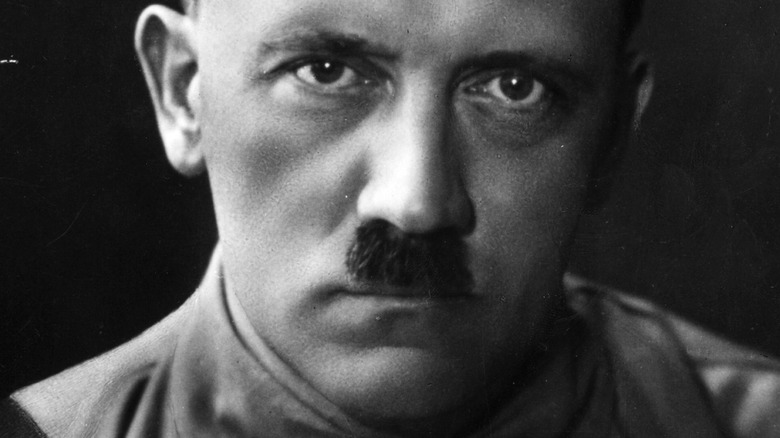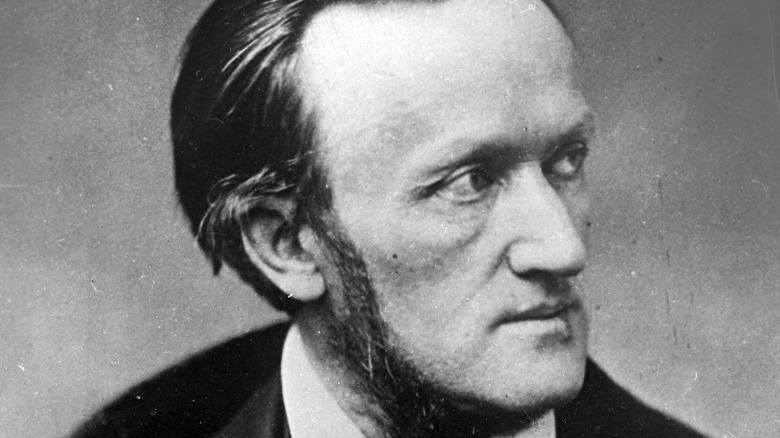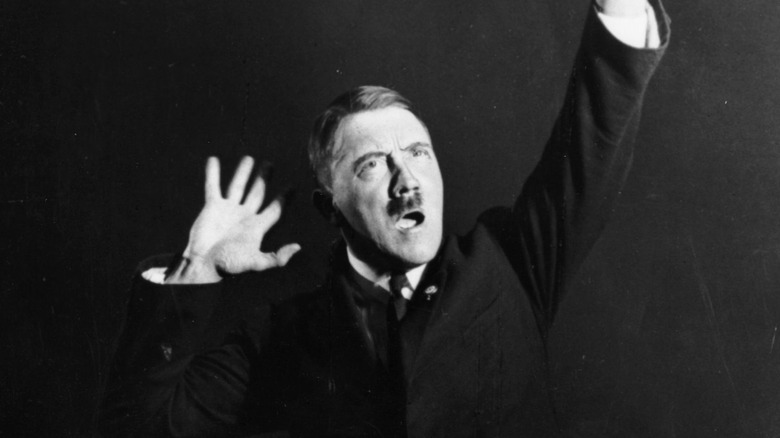Adolf Hitler's Unusual So-Called Addiction Fueled His Infamous Rallies
One can't help but wonder what creates the psyche of someone as malicious and cruel as Adolf Hitler. The 20th century's most notorious dictator, he led with oppressive cruelty while overseeing the ruthless and systematic genocide of around 11 million people (per the National WWII Museum). Had the world at large not taken sweeping combative efforts to stop him, there's no telling how far the influence of his diabolically depraved regime would have extended. World War II was one of the most harrowing epochs in modern history and at the center of the war's European front stood a single man who will forever be remembered as the most atrocious adversary to human life in recent history (via Britannica).
Today, we look back on the dictator who erected the infamous faction of Nazis with a careful scope of understanding and scrutiny. The various details of Hitler's personal life were at times indicative of a relatively composed, agreeable individual. However, at other times, those things that substantiated his true nature reflected something deeply disturbing and unsettling. According to The Vintage News, Adolf Hitler harbored certain predilections that many people would likely raise a perplexed eyebrow at. The German leader reportedly had unusual sexual tendencies while he was also reputed to have had a distinct appreciation for Disney films. There was something else he enjoyed doing that, by his own admission, bordered on addiction, and it's far from anything you'd expect.
Adolf Hitler was addicted to going to the opera
The Vintage News reports that, as a boy, Adolf Hitler would often play hooky from school and scurry off to the local theater to catch an opera matinee. It was at the age of 12 that the young man who would one day become Germany's most merciless leader discovered the revered work of Richard Wagner. The German composer, who lived between 1813 and 1883, whose pieces have been featured in countless plays, films, and other showcases (remember that scene from "Apocalypse Now" when a fleet of attack helicopters blast Wagner's "Flight of the Valkyries" into the air as they descend upon a Vietnamese village?). The effect of his music upon the young Hitler was so profound that he could hardly control his insatiable urge to watch it score stage dramas as often as possible. Additionally, Wagner's beliefs were something that Hitler hitched himself to. According to Music and the Holocaust, while in exile in 1850, Wagner wrote "Das Judentum in der Musik," a treatise that claimed that Jews were incapable of artistic creation and expression.
Hitler's obsession with the opera and Wagner's music endured over the years, and, upon rising to power with the Nazi party at his behest, Hitler would regularly host rallies with the composer's iconic numbers resounding over the crowd from a loudspeaker. According to The Vintage News, such boisterous and grandiose theatrics became a central agent in those public conglomerations of Hitler's ideological progenies, and Wagner grew wildly popular amongst the modern German populace once again. "Wagner's line of thought is intimately familiar to me," the Nazi leader once said. "At every stage of my life, I come back to him ... " (per The Telegraph U.K.).
Hitler once wrote his own opera
It would seem that Adolf Hitler's ravenous fascination with Richard Wagner and the opera was too large to confine itself to mere spectatorship. According to Classic FM, Germany's most condemned and reviled leader wrote his own opera when he was only 20 years old. That's right — in 1908, Hitler drafted up the first and only (known) copy of "Wieland der Schmied" (Wieland the Smith); an opera based off of one of Wagner's unfinished works. As to whether or not he ever had legitimate plans to develop it into a tangible stage play, historians are unsure. However, the original manuscript is still regularly showcased in various exhibits and museums across the world. In early 2020, "Young Hitler: The Formative Years of a Dictator," an exhibit in Sankt Poelten, Austria, which displayed the document as part of its intrinsic look at Hitler's early years through a series of artifacts that once belonged to him.
"My youthful enthusiasm for the Bayreuth Master [Wagner] knew no bounds," he once declared (per Classic FM). Hitler's primal infatuation with art prompted him to apply to the Vienna Academy of Fine Arts two separate times as a young man (once in 1907 and again in 1908), though he was never granted acceptance. "Weiland der Schmied" was just one of several failed ventures into the realm of the fine arts that Adolf Hitler would produce before his career as a genocidal tyrant commenced.


